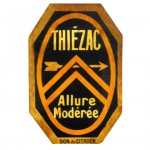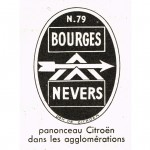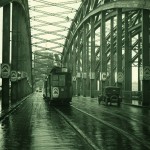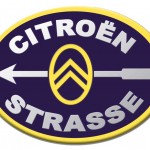
(English below, en Francais au-dessous)
Vor 95 Jahren, am 20. Februar 1921, startete Firmengründer André Citroën ein aufwändiges Projekt, um die bis zu diesem Zeitpunkt unzureichende Straßenbeschilderung in Frankreich zu verbessern: Er stiftete in ganz Frankreich sogenannte „Plaques Citroën“, die im Straßenverkehr als Hinweis- und Gefahrenschilder dienten. Die zunächst achteckig, später oval geformten Blechschilder verfügten über den Zusatz „Don de Citroën“ (auf deutsch: „gestiftet von Citroën“).
Die rasant steigende Anzahl an Automobilen im Straßenverkehr bei zugleich unzureichender Beschilderung, verbunden mit immer häufiger auftretenden Unfällen, brachten André Citroën auf die Idee, Verkehrsschilder zu spenden und somit für mehr Ordnung im Straßenverkehr zu sorgen.
Dass die „Plaques Citroën“ zugleich als Werbetafeln für die Marke mit dem Doppelwinkel dienten, belegt die Kreativität und Innovationskraft, mit der Firmengründer André Citroën auch in Sachen Werbung zu überraschen wusste.
In den 1920er und 30er Jahren folgte in Frankreich ein wahres Wettrennen unter den Automobilherstellern und Zuliefererbetrieben: Jedes Unternehmen wollte möglichst viele Verkehrsschilder produzieren und stiften, um eine möglichst hohe Präsenz im Straßenverkehr zu gewährleisten – ein Wettstreit, den Citroën eindeutig für sich entscheiden konnte. Bis 1937 waren über 165.000 „Plaques Citroën“ an Frankreichs Straßen sowie in den damaligen algerischen Departements zu sehen.
Citroën Beschilderung auch in Köln
Auch in Deutschland wurden in den Vorkriegsjahren die heute noch als Sammlerstücke begehrten „Plaques Citroën“ aufgestellt: Eine Aufnahme der Hohenzollernbrücke aus dem Jahr 1928 zeigt, dass die viel befahrene Brücke im Herzen Kölns ebenfalls komplett mit achteckigen Citroën Schildern versehen war.
Soweit die Pressemitteilung der Citroën Deutschland GmbH, hier im Download.
Auch heute ist die Idee der Beschilderung der französischen Strassen Basis für ein weiteres Logo – die Ausstellergemeinschaft der deutschen Citroën-Clubs, die sog. “Citroën-Strasse”, die z.B. auf der Technoclassica im April 2016 wieder zu finden sein wird, stellt den unmittelbaren Bezug zu der einzigartigen Vergangenheit des Unternehmens mit ihrem Logo dar.
—–
Today – 95 years ago: a revolution on the streets of France, by André Citroën
95 years ago, on 20 February 1921, company founder André Citroën launched a complex project to improve by this time inadequate road signs in France: He founded in France the so-called “Plaques Citroën” street and directional signs which actively contributed to the road safety. The initially octagonal shaped, later oval shaped metal signs were signed by the slogan “Don de Citroën” (translated: “donated by Citroën”).
The massively increasing number of automobiles on the French roads led to a dramatic increase of traffic. At the same time, there was a need to know in which direction to go to find your destination. Many accidents happened at crossings when drivers were unsure on where to go. This was the key motivation for André Citroën to donate street signs and thus contribute to an added level of road safety.
The so-called “plaques Citroën” served additionally as billboards for the “double-chevron” brand – one of the numerous examples for creativity and innovation which the company’s founder, André Citroën, could again prove also in terms of advertising.
During the 1920s and 30s in France a veritable race started amongst automobile manufacturers and supplier companies: Each company wanted to produce a large volume of road signs to ensure the highest possible presence on the road – a competition which Citroën clearly could win. Until 1937, more than 165,000 “plaques Citroën” were mounted on France’s streetsas well as in the former Algerian departements.
Citroën street signs in Cologne
Also in Germany, Citroën street signs were present in the pre-war years. The today highly-sought collectors’ items were for example visible on the Hohenzollern Bridge in the heart of Cologne around 1928.
We’d like to thank Citroën Germany for triggering this interesting press release (download).
It should be noted that this innovative marketing idea has also been the basis to visualize the Association of the German Citroën clubs – the so-called “Citroën-Strasse” will be presenting the clubs and their vehicles at Techno-Classica 2016 in a few weeks from now.
—–
20 Fevrier 1921: une revolution commence sur les routes en France – “Don De Citroën”
95 ans avant, le 20 Février 1921, le fondateur de la société, André Citroën, a lancé un projet complexe pour améliorer par ce temps la signalisation routière insuffisante en France:
il a fondé en France les panneaux de signalisation et directionnels dit “Plaques Citroën” qui ont contribué activement pour la sécurité routière. La forme octogonale, aprés forme ovale des panneaux ont été signés par le slogan “Don de Citroën”.
Le nombre des voitures sur les routes françaises a conduit à une augmentation du trafic. Dans le même temps, il y avait un besoin de savoir dans quelle direction aller pour trouver votre destination. De nombreux accidents sont survenus aux passages à niveau lorsque les pilotes ne savaient pas où aller. Ce fut la principale motivation pour André Citroën de faire le don de plaques de rue et contribuer ainsi à un niveau supplémentaire de sécurité routière.
Le soi-disant “plaques Citroën” servi en outre que les panneaux d’affichage de la marque “double chevron” – l’un des nombreux exemples de la créativité et de l’innovation qui le fondateur de l’entreprise, André Citroën, pourrait à nouveau se révéler aussi en termes de publicité.
Au cours des années 1920 et 30 en France une véritable course a commencé entre les constructeurs automobiles et les sociétés sous-traitantes: Chaque entreprise voulait produire un grand volume de panneaux de signalisation pour assurer la présence la plus élevée possible sur la route – une compétition qui Citroën clairement pourrait gagner. Jusqu’en 1937, plus de 165.000 “plaques Citroën” ont été montés sur les rues de la France ainsi que dans les anciens départements algériens.
Citroën plaques de rue aussi à Cologne
En Allemagne aussi, les plaques de rue Citroën étaient présents dans les années d’avant-guerre. Le aujourd’hui très recherché des objets de collection étaient par exemple visible sur le pont Hohenzollern au cœur de Cologne vers 1928.
Merci a la presse Citroën en Allemagne pour nous informer! (download).
Il est à noter que cette idée marketing innovante a également été à la base de visualiser l’Association des clubs allemand Citroën – la soi-disant “Citroën-Strasse” présentera les clubs et leurs véhicules à Techno-Classica 2016 dans quelques semaines à partir de maintenant.


